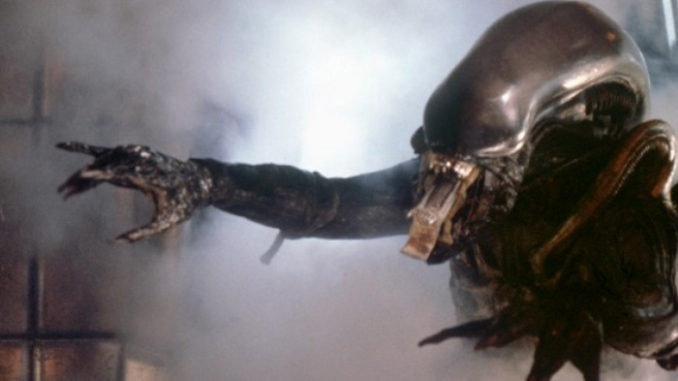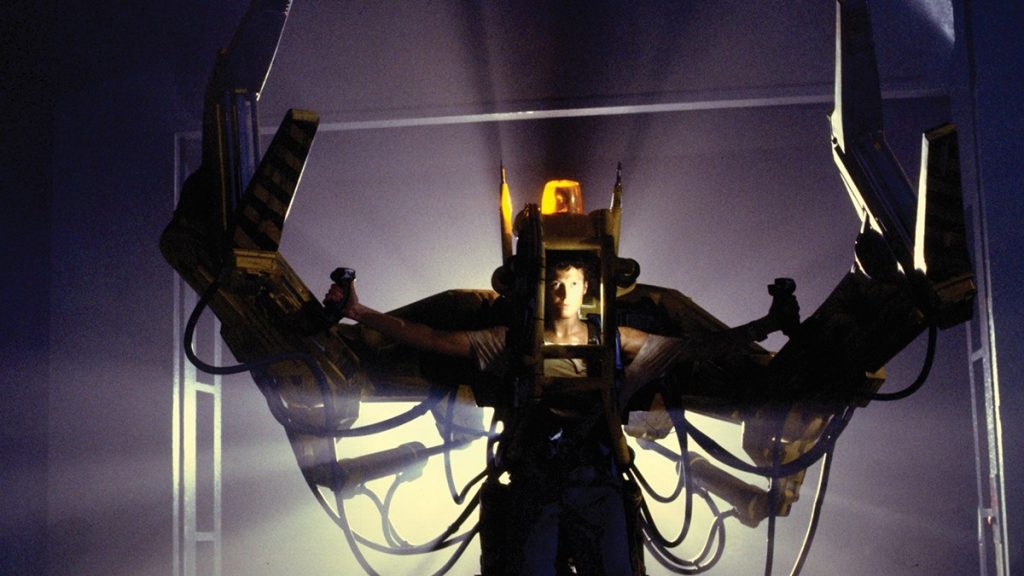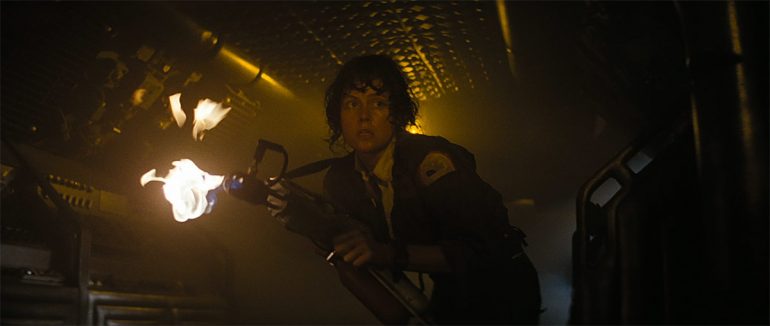In space, no one can hear you scream…and it’s game over, man. Released in 1979, Alien was an old-school straight-up horror movie that brought a new kind of monster to the big screen. It’s sequel, released in 1986, brought a big-time action element, and a grander scale than Ridley Scott’s claustrophobic masterpiece. Since then, the lead, Ellen Ripley has died and been reborn as a hybrid, the Predator arrived on the scene, and Scott spun the origins of the xenomorph species. All have failed to live up to the legendary, iconic status of the first two films in the series. The question remains, though…which one is better?

Alien (1979)
The Story: Set in a cynical future where a large corporation has no problem endangering its worker’s lives to get its hands on a new kind of organism (which you would think they would find a way to weaponize and sell), Alien is a grim, dark story. Sparse in characters and for the most part, dialogue, you quickly get to know each of the crew members, even though they don’t have to go through hours of explaining their backstories. The alien isn’t introduced until half-way through the movie, but when it is, it begins to pick off the crew members, one-by-one, leading to a chilling and memorable conclusion. While the movie provides little in the way of surprise (save the truth about Ash’s character), the simplicity of the story only heightens the tension as the audience perfectly understands the stakes involved.
The Style: Alien is one of those movies that you don’t think about the style until you’ve seen it a bunch of times, but when you do, you realize what a genius Ridley Scott is. Everything in the Nostromo seems a little off – doorways seem slightly tilted, ceilings are low, doorways are tight – it’s supposed to elicit a feeling of unease and uncertainty, of the world closing in – or more accurately, that there are very few places to hide from danger on the ship – and it works. After the xenomorph’s introduction, the crew constantly seem under attack, even though the alien doesn’t show up that often.
The Characters: There’s a type for everyone in this movie. You have the leader in Tom Skerritt’s character, Dallas, Lambert (Veronica Cartwright) is nervous and twitchy, Parker and Brett are opportunistic, cynical and can be seen as passive-aggressive at times, Ash (Ian Holm) is cerebral and an outsider on the crew, Ripley is strong and uses common sense, John Hurt’s character Kane is an everyman bloke who gets along with everyone, it seems. Though the characters are different, you can believe that they are an actual crew and they get along, for the most part. You can also believe the conflicts that arise. Like I stated earlier, the genius is that the characters come across as real people, and you can believe all the interpersonal relationships that are shown with little-to-no context.
The Horror/Action: Alien is one of those slow-burn type movies where you don’t have a ton of action, but there always seems to be something going on. The horror emanates not from a lot of gore or a high body count (though most of the characters do die), but from the tension of not knowing where the alien is or what it’s doing. When it does attack, it is imposing, larger than any of the characters and seems more like a hunter than anything, systematically hiding from, and then attacking the crew members, when they are most vulnerable. Add in Ash’s betrayal and that infamous climax, and it wouldn’t be surprising if some people consider Alien one of the scariest movies they’ve ever seen, even without the tricks and excesses that modern horror movies take.

Aliens (1986)
The Story: A bunch of space marines go to a planet colonized by humans and get their lunches handed to them by a bunch of aliens. That’s the story in a nutshell. However, the movie is clever in either extending or twisting expectations and themes from the first film. The android is a good guy in this film. Someone still wants to capture the alien to study and weaponize it. Ripley must still save the day, this time also asking a surrogate mother for a child she barely knows after realizing that she lost the chance to see her own daughter’s life (shown in the extended cut). This movie’s story feels like an extension of the first film but shows just enough to make it its own.
The Style: Where the first film was very stylized and small, this movie is large and bombastic. The Marines show up and have a lot of weapons, showing machismo and an arrogance that is soon shattered as they don’t realize the extent of the threat they’re facing. While the film is more accessible to a mainstream audience, it does lack the subtlety of the original that made its style more unique. While the world of the first film only takes place mostly in a limited amount of rooms, Cameron’s vision opens things up and gives him a series of environments to play in, including sewers and an almost inhospitable surface of the planet. Some could criticize this as a flaw, but the purpose of a sequel is not to imitate, but to explore the other possibilities in the world originally created, which Aliens does with flair.
The Characters: Ripley is still the standout here, as she assumes the leadership mantle that she reluctantly assumed closer to the end of the first film. Much like Alien, this sequel is great at having the characters’ show their personalities without a great deal of explanation. In this case, you can almost lump the Marines under one persona, as collectively they come across as cocky and immature, with the noted exception of Michael Biehn’s Hicks, who is far more thoughtful and professional than his companions. Most interesting, Bill Paxton’s Hudson seems to experience the largest character arc, going from a gung-ho soldier to a cowering wimp within a matter of minutes, only to die a true hero, holding off an alien horde and allowing everyone else to escape.
The Horror/Action: Oh yes, if there’s definitely one place that this film trumps the first one, it’s with the action. Right from the beginning of the Marine’s mission, you get a sense of unease, as the audience is essentially trapped in the command bunker with Ripley, watching helplessly as the Marines get slaughtered. From there, the tension that existed in the first film boils over, as the humans try to escape from the xenomorphs, who seem to be coming from everywhere. My favourite scene has to be the sweat-inducing one where a panicky Hudson calls out the relentless advance by an alien troop, even though the group cannot visually see their quarry. Hicks then decides to check the ceiling and finds the overhead vent simply stuffed with xenomorphs. What follows is an epic firefight that sadly results in Hudson’s demise. That entire scene is the perfect epitome of all that is great with this film, as it blends both horror and action in a perfect balance.
The Verdict
This is a tough one, as I’m comparing oranges to hand grenades. Both films are great in their own right and Aliens continues Ripley’s story without imitating the original, so it’s not as if you can focus on both films trying to achieve the same goal. At the end of the day, I give the slightest nod to the original, only because it’s a little more stylish and original, and it did more with less, which I can’t say for Aliens. Both films though deserve all of the praise that has been heaped on them, as even though the Alien series continues, I doubt any of the future efforts will be able to supersede either of these movies.






